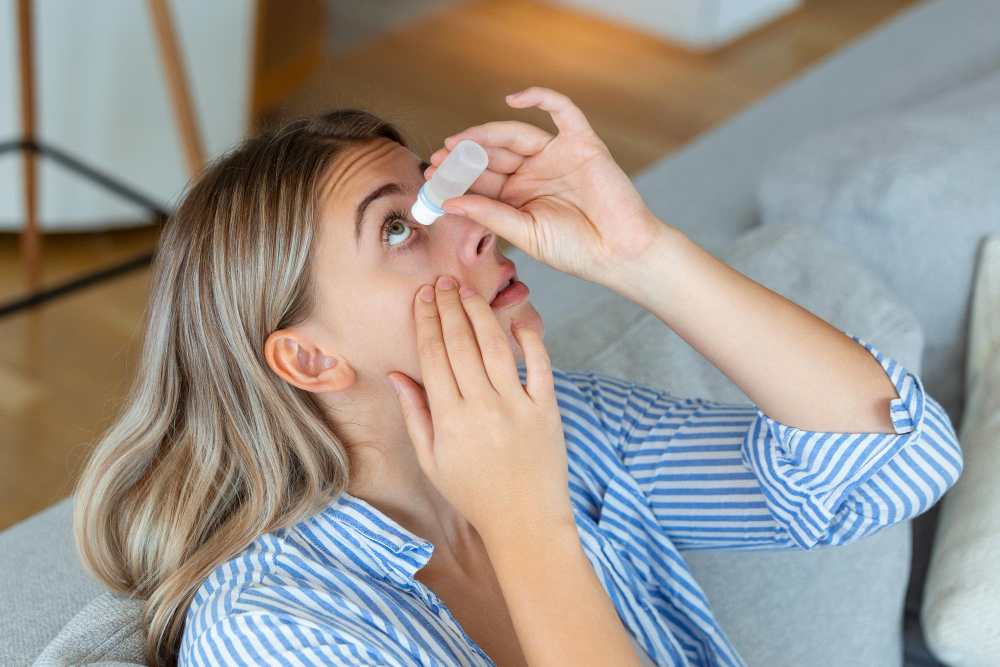
Are you struggling with dry eyes but still want to wear contact lenses? You are in the right place. Many people face the challenge of balancing comfort and vision clarity when wearing contacts.
This is a common issue, and wearing contact lenses can often exacerbate the discomfort. So, what should you do if you have dry eyes and still want to use contacts?
In this guide, we will discuss everything about dry eyes and contacts. We will learn what causes dry eyes with contacts and how to find the right solution.
Let’s get started!
What Are Dry Eyes?

Dry eyes occur when our body produces an insufficient amount of tears or the tears evaporate too quickly. That results in a lack of moisture in the eyes.
When your eyes are dry, it affects the quality of your vision. It can lead to discomfort, and your eyes may become more sensitive to light, causing a feeling of tiredness.
This condition may result in various other symptoms, including:
- Burning Sensation
- Itching
- Redness
- Blurry Vision
- A Feeling of Grit or Something in the Eye
What Are the Causes of Dry Eyes?
A variety of factors may contribute to this issue, such as:
- Environmental Factors: Dry air, wind, and exposure to heating or air conditioning can contribute to moisture loss.
- Medical Conditions: Diabetes, rheumatoid arthritis, and thyroid disorders can disrupt tear production.
- Medications: Some medications, including antihistamines, decongestants, and those for blood pressure, can reduce tear production.
- Aging: As people age, tear production naturally decreases, which leads to drier eyes, particularly in women after menopause.
How Contact Lenses Affect Dry Eyes

Contact lenses can exacerbate your eyes in several ways. They may block oxygen from reaching the cornea, which is important for your eyes to stay moist.
When your eyes are deprived of oxygen, they can become irritated and dry. This problem is more pronounced in certain types of lenses, such as those not designed for extended wear.
The following types of contact lenses can have varying effects on your eyes:
- Soft Lenses: These are the most common type but may absorb moisture from the eyes, contributing to dryness.
- Rigid Gas Permeable (RGP) Lenses: While they allow more oxygen to pass through, they can be uncomfortable for the patients.
- Extended Wear Lenses: These are worn overnight and can cause significant dryness because they reduce the natural tear flow to the eyes.
Common Issues with Wearing Contact Lenses and Dry Eyes
While wearing contacts may be safe for short periods, it is essential to monitor your symptoms closely.
If you experience ongoing dryness, discomfort, or irritation, consult your eye care professional. Overlooking these symptoms may result in more serious eye issues.
Wearing contact lenses can have long-term effects on eye health. Prolonged eye dryness can lead to:
- Corneal Damage: Persistent dryness may cause damage to the cornea (the clear outer layer of the eye).
- Infections: They may lead to less effective tear production, increasing the risk of infection.
- Increased Discomfort: The discomfort caused by eye dryness can worsen over time, making it difficult to wear contacts.
How to Manage Dry Eyes While Wearing Contact Lenses

To effectively manage dry eyes contacts, it is important to explore a combination of solutions, such as using hydrating lenses, artificial tears, and maintaining proper lens care.
However, if these measures do not provide sufficient relief, you may need to consider alternative options, like glasses or scleral lenses.
- Hydrating Contact Lenses
One solution for dry eyes is to use Hydrolens or silicone hydrogel lenses. These lenses allow more oxygen to reach the cornea, reducing the risk of dryness. They also retain moisture better than traditional soft lenses.
- Using Artificial Tears
Artificial tears are lubricating eye drops that can be used throughout the day to keep the eyes moist. Over-the-counter lubricating eye drops can help relieve the discomfort.
- Proper Lens Care and Cleaning
It is also crucial to maintain proper hygiene when handling your lenses. Regular cleaning and disinfecting of your contact lenses can prevent irritation and infections caused by bacteria or other particles.
Make sure to follow the cleaning instructions provided by your optometrist or the manufacturer of your lenses.
- Consider Switching Lenses
If you continue to experience discomfort despite trying hydrating lenses and lubricating drops, it may be time to consider switching to a different type of contact lens.
For example, Scleral lenses are larger lenses that create a reservoir of moisture over the cornea. These may be a better option for those with chronic dry eyes.
What Are Some Alternative Options for People with Dry Eyes?
If contact lenses are not a comfortable option for you, you can consider these alternatives:
- Eyeglasses for Dry Eye Sufferers
Eyeglasses are an excellent alternative for patients. Unlike contact lenses, eyeglasses do not block oxygen and irritate the eyes in the same way. They may be the best choice if you are looking to avoid further complications with your eyes.
- Scleral Lenses for Severe Dry Eyes
If your condition is severe and you can not wear regular contact lenses, scleral lenses might be the solution. These lenses are designed to cover the entire cornea and create a sealed, moisture-filled pocket over the eye. This design helps to keep the eyes hydrated and comfortable throughout the day.
How Texan Eye Care Can Help Patients with Dry Eyes
At Texan Eye Care, our team specializes in providing personalized solutions for individuals struggling with contacts eyes dryness.
Whether you’re seeking the right type of contact lenses, such as Hydrolens or silicone hydrogel lenses, or exploring alternative options like scleral lenses, we offer expert guidance tailored to your specific needs.
We are committed to helping you achieve comfort and clarity, ensuring that your eye health and vision are always our top priority.
Final Thoughts
Wearing contacts with dry eyes is possible, but it requires careful consideration. By choosing the right type of contact lenses, maintaining proper eye hygiene, and using lubricating drops, you can enjoy the convenience of contacts.
If your eye dryness persists or worsens, consulting with an eye care professional such as Texan Eye Care is crucial. Whether you decide to switch lenses or explore alternatives, we offer many ways to manage dry eyes while helping you maintain clear and comfortable vision.
